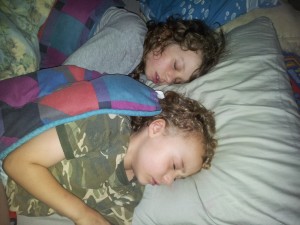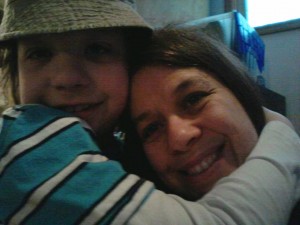Three nights ago, I made the excruciating decision to kick my children out of bed. My bed, that is.
To give a bit of background, my kids have always had full and free access to me, at any time of the day or night. When they have woken up in the middle of the night having had a bad dream, or feeling sick or lonely, they have been allowed to get into bed with me and snuggle up. It’s not always comfortable, being squished on both sides by children, but I have always loved it. Because what is better than hugs from your children?
As much as I love it, though, there are downsides. For one thing, my children take up an inordinate amount of space in the bed for such small people. It’s like they morph into starfish at night, and there are arms and legs everywhere, squashing my face and poking into my spine. For another thing, these little people are getting less little. George, who is ten, has reached the same height as my mother-in-law (OK, so she’s a little old lady, but still), and eight-year-old James is getting there as well.
What this means is that these nocturnal cuddles are costing me an enormous amount of sleep, and that makes it difficult for me to both function and be a human being that other people want to be around. In addition to that, George has started showing signs of puberty, and my husband and I have been feeling the need to carve out more time with each other.
We have reluctantly agreed that it is time for the kids to stay in their own beds at night.
James has accepted this with ease, but for George it is a massive change. Kids with autism do not appreciate it when the boat is rocked, and this particular change represents a tidal wave for him. It has been difficult for him, and by extension, difficult for us.
For the first two nights, James was the only person who got any sleep. My husband and I would lie helplessly in our bed, listening to George’s plaintive pleadings. He kept wandering into our room, and I kept taking him back to his own bed. I would get him settled, tuck him in and give him a kiss, and then go back to bed. And then I would do it again. And again, and again, and again.
While all of this was going on, George was whimpering, “I want Mommy. Lie down with Mommy in the bed.” And then, as he got sadder and sadder, he was simply calling my name.
I so badly wanted to cave. I so badly wanted to go to him, lie down with him and wrap my arms around him. But I knew that I couldn’t. In order to make this change, we would have to be persistent and patient, gentle and firm. We would have to just lie in bed and listen to our child being sad.
Sigh.
Last night – the third night – we caught a break. George went to sleep in his own bed, and he stayed there for the whole night. There was not so much as a whimper, not the slightest bit of movement. As much as I like to think that this represented an acceptance of the changes, I am realistic enough to know that the poor child was probably just too exhausted to protest. We may be in for another few nights of sleeplessness, and we will deal with it for as long as we need to.
As parents, it is our responsibility to guide our children towards independence, and this is an important step in that direction, even if, at the end of the day, it is harder for me than it is for them.
This is an original post by Kirsten Doyle. Photo credit to the author.












